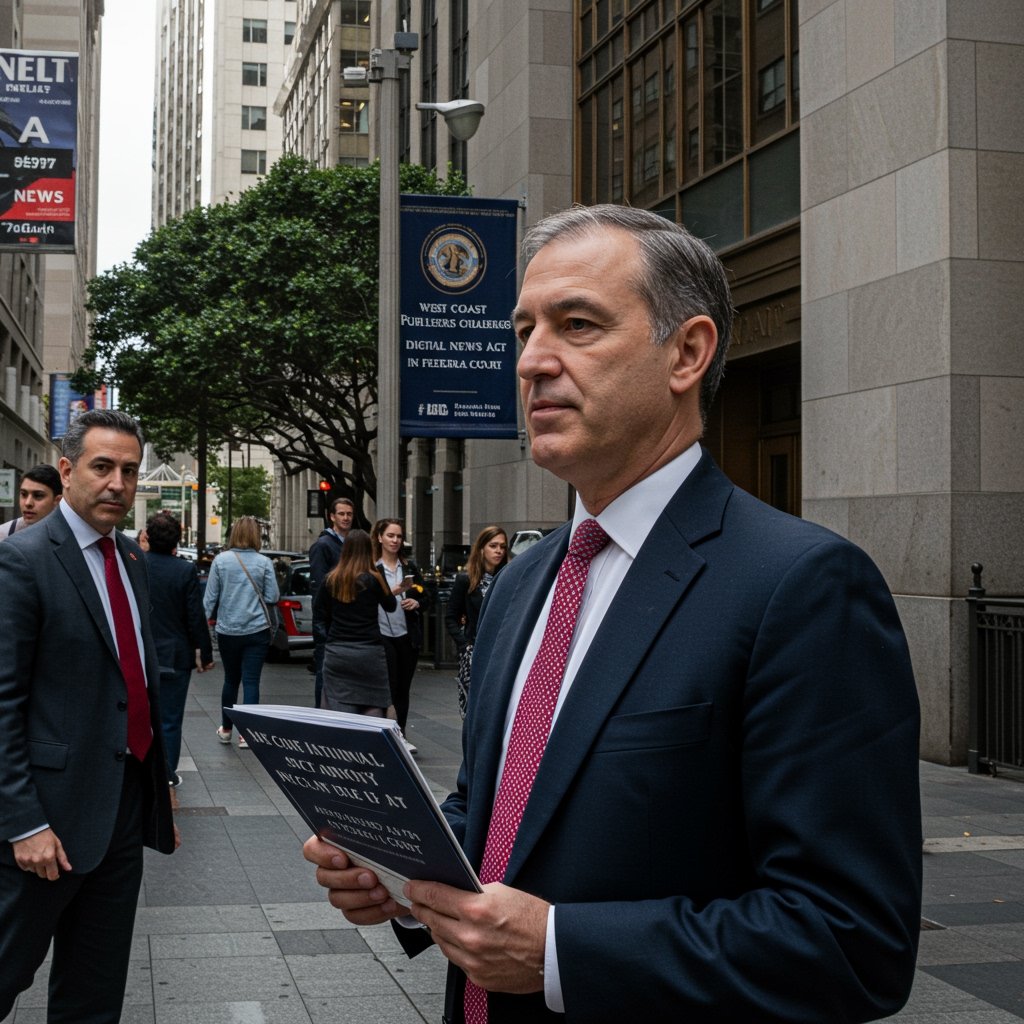West Coast Publishers File Lawsuit Against California’s Digital News Preservation Act
A coalition of prominent West Coast news publishers has initiated significant legal action, filing a lawsuit challenging the constitutionality and framework of California’s recently enacted Digital News Preservation Act. The lawsuit, lodged in federal court, represents a critical juncture in the ongoing national and international debate over how online platforms should compensate news organizations for the use of their journalistic content.
Key plaintiffs in the case include members of the California News Publishers Association (CNPA) and representatives from major regional outlets such as the Los Angeles Times and the Seattle Times. They argue that the state legislation, intended to bolster the struggling local news industry, fails to establish a fair or adequate compensation system and contains fundamental flaws that could undermine, rather than support, independent journalism.
Understanding the California Digital News Preservation Act (Assembly Bill 123)
The legislation at the heart of this legal dispute is the California Digital News Preservation Act, known as Assembly Bill 123 (AB 123). This Act was officially signed into state law on February 15, 2025, following passage by the California State Legislature. Its stated primary objective is to create a mechanism requiring large online technology platforms—specifically those deriving significant value from the distribution of news content—to compensate news publishers for the use of their journalistic work.
The Act is designed to address the perceived power imbalance between these dominant online platforms and news organizations. Publishers contend that platforms benefit immensely from linking to or utilizing snippets of news articles, attracting user engagement and generating advertising revenue, while the originators of the content—the newsrooms investing in reporting and production—do not receive proportional compensation. AB 123 was envisioned as a remedy to this situation, aiming to direct much-needed revenue back into news operations to support essential public service journalism, particularly at the local level which has seen significant decline in recent years.
Under the provisions of AB 123, a compensation model was established, mandating payments from covered platforms to eligible news organizations. This model was slated to officially take effect on April 1, 2025. However, its specific design and the proposed level of compensation are now the central points of contention raised by the publishers in their legal challenge.
Publishers’ Grievances: Allegations of Inadequacy and Structural Flaws
The core of the publishers’ lawsuit rests on their assertion that the compensation model established by the California Digital News Preservation Act is both inadequate and structurally flawed. While they support the fundamental principle that platforms should pay for content that generates value for them, the publishers argue that the Act’s specific mechanism for determining and distributing payments fails to achieve this goal effectively.
The lawsuit brought by the California News Publishers Association, the Los Angeles Times, the Seattle Times, and others, details concerns that the Act’s formula or process for calculating payments does not accurately reflect the true economic value that news content provides to large online platforms. Publishers worry that the mandated compensation will be a nominal amount that does little to offset the significant costs of producing quality journalism, nor will it fairly compensate them for the value derived by the platforms.
Furthermore, the publishers allege that the structure of the payment system itself is problematic. They may argue it is overly complex, arbitrary, or includes provisions that could inadvertently disadvantage certain types of news organizations or fail to incentivize the continued production of high-quality, in-depth reporting. Their legal challenge suggests that while the intent of AB 123 might be laudable, its practical implementation through the proposed compensation model is deeply unsatisfactory and potentially harmful to the very industry it seeks to aid.
The Tech Platforms’ Perspective: Value Through Referrals
In contrast to the publishers’ claims, the large online technology platforms affected by AB 123 have consistently argued that they already provide substantial value to news organizations, primarily through referral traffic. Companies like Google and Meta (Facebook) have stated that links on their platforms drive significant numbers of readers directly to news websites, which in turn allows publishers to earn advertising revenue and build audience loyalty.
From the platforms’ viewpoint, mandating additional direct payments constitutes an unfair ‘link tax’ and disregards the existing benefits they provide. They often highlight that publishers willingly post content on their platforms or make it available for linking precisely because of the broad reach and audience access these platforms offer. This fundamental disagreement over where value lies—in the display and use of content on the platform, or in the referral traffic generated back to the publisher’s site—forms the ideological backdrop to the legal and legislative battles unfolding in California and elsewhere.
The Legal Challenge: Seeking an Injunction in Federal Court
The formal legal challenge against the California Digital News Preservation Act was filed on March 7, 2025. The lawsuit was brought in the U.S. District Court for the Northern District of California, a venue often utilized for cases involving technology companies and intellectual property disputes, given its location in the heart of Silicon Valley.
In their filing, the plaintiff publishers are seeking various forms of relief from the court, most immediately an injunction. An injunction, if granted by the federal court, would serve to block or at least delay the implementation of AB 123, specifically preventing the compensation mandate from taking effect on its scheduled date of April 1, 2025. The publishers likely argue that allowing the flawed payment system to proceed would cause them irreparable harm.
The lawsuit could also raise broader constitutional questions regarding a state’s authority to regulate internet platforms in this manner, potentially alleging that AB 123 interferes with interstate commerce or violates other federal laws or constitutional principles.
Broader Implications: A National and Global Debate
This lawsuit is not occurring in a vacuum. It is part of a larger, global reckoning regarding the relationship between news publishers and the dominant online platforms that have become primary gateways for news consumption. Similar legislative and regulatory efforts have been pursued or are underway in other jurisdictions, including Canada and Australia, with varying degrees of success and often facing strong opposition from the tech industry.
The outcome of the case in the U.S. District Court for the Northern District of California could have significant ramifications extending far beyond California’s borders. A ruling in favor of the publishers, particularly one that halts the implementation of the Act, could slow or complicate similar legislative efforts in other U.S. states. Conversely, if the Act were eventually upheld or modified through court direction, it could provide a potential template for future legislation nationwide.
Regardless of the immediate legal result, this lawsuit ensures that the debate over fair compensation for online news content will remain a prominent issue. It highlights the economic pressures facing the news industry and the complex challenge of adapting existing business models and regulatory frameworks to the digital age, where the consumption of news is increasingly mediated by powerful global technology platforms.



















